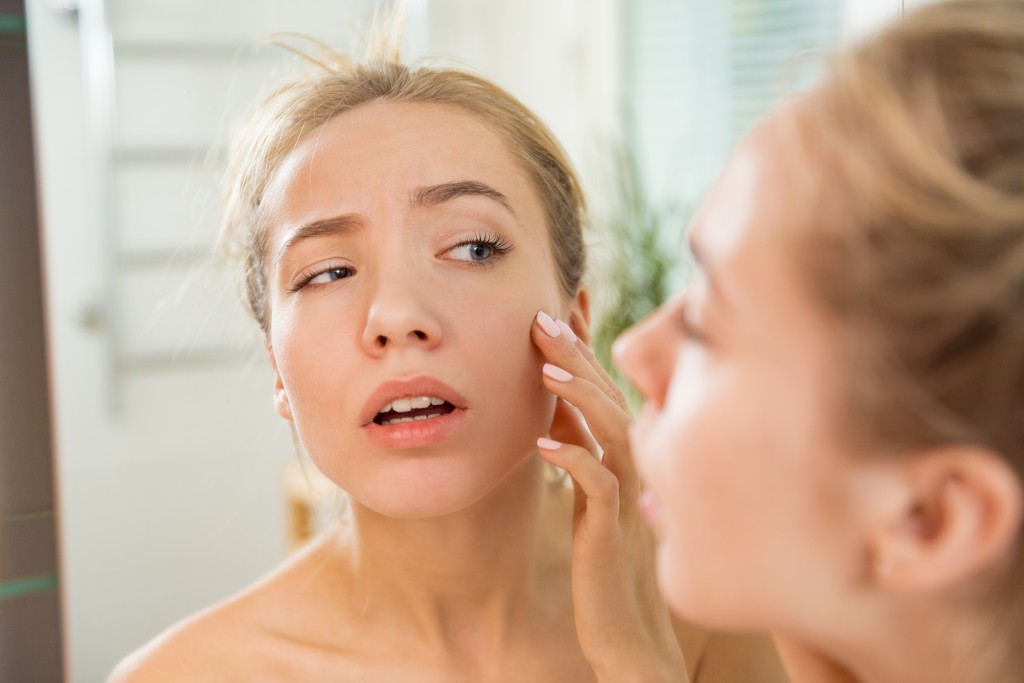The coronavirus disease pandemic has made a tremendous adverse impact on all aspects of our lives. The uncertainty of what could happen next is overwhelming to the majority of people.
It triggers strong emotions and induces stress and anxiety. Social distancing and shelter-at-home orders, although necessary for everyone’s safety, only caused people to feel more isolated and lonelier.
While stress and anxiety are two human reactions that are perfectly normal in any threatening or worrying situation, prolonged exposure to these two could lead to damaging effects on our skin, hair, and nails, among other health-related concerns.
Common Effects of Stress on Our Skin
Since we all have different genetic makeup, our bodies and skin react differently to stress. Below are the four common skin issues that you might experience due to frequent exposure to stress.
Hives and Rashes
Prolonged exposure to stress can slow down one’s digestion. A slowed digestion will allow an overgrowth of unhealthy bacteria which causes dysbiosis, or gut imbalance. As this gut imbalance leaks out of your intestine linings, it triggers a bodywide inflammation. In response to this inflammation, your skin develops hives or stress rash.
These hives can occur anywhere in your body. They are raised, red-colored sports varying in size. Most stress rash can be cured at home using antihistamines. In some extreme cases, you might need to consult your doctor for any appropriate medication such as taking medical-grade probiotics, steroids, or antibiotics.
Acne Breakouts
Stress and acne go hand-in-hand. When you experience stress, your brain produces various hormones that help your body deal with the stressful environment. This shift in hormone levels, particularly in cortisol, triggers glands under your skin to secrete more oil. As some excess oil gets trapped inside hair follicles along with dirt and dead skin cells, pimples are produced.
Acne breakouts can be prevented by keeping a regular skincare routine using well-known and trusted facial products which you can buy off over the counter. Nonetheless, if your acne breakouts are severe, you can have your acne treated by a trained and experienced skin expert.
Flare-ups
When you are stressed, your body goes into a fight-or-flight mode. Stress triggers the increased release of cortisol and adrenaline in our body. Overproduction of these hormones due to prolonged stress exposure cause individuals who are predisposed to skin conditions such as eczema and psoriasis to flare-up.
People under stress are often too distracted to mind their skincare regimen. If you are predisposed to some skin condition, it is best not to neglect taking care of your skin no matter how stressed you are. Moisturize your skin often, do not use harsh soaps, and avoid sudden changes in temperature.
Wrinkles and Fine Lines
Stress can make your skin dry and flaky, which in turn causes wrinkles and fine lines. If you are under stress, there is a huge chance you are not getting enough proper hydration. Furthermore, people who are stressed are more likely to make certain facial expressions, like pursing their lips and furrowing their brows. Over time, constant frowning and pouting can lead to deeper lines in these areas.
Despite being under a great amount of stress, you must stay hydrated. You can even include in your beauty regimen skin hydrating products to have a fresh-looking, dewy skin. Doing some facial exercise also helps you avoid making certain unconscious facial expressions.

How You Can Fight the Damaging Effects of Stress on Your Skin
Get a Good Night Sleep
Getting enough sleep is easier said than done. However, to help your skin heal from stress, it is important to have seven to nine hours of solid sleep. Refrain from using electronic devices an hour or two before you go to sleep. Drinking caffeine-free tea also helps you calm down and relax, preparing your body for a good night’s sleep.
Eat Right, Eat Healthily
It is common knowledge that your skin reflects the quality of the food you are eating. Apart from staying hydrated by drinking plenty of water, have a well-balanced diet. Eat the right amount of food rich in fiber, high-quality protein, and unrefined carbohydrates. Sweets and junk foods might be tempting options to consume when you are stressed out, but it will only add more health problems.
Sweat If Off
Exercising for at least three to four times a week also helps reduce the negative impact of stress in your body. Exercising is a great way to flush out stress hormones like cortisol and adrenaline. Apart from that, when you exercise, your body releases its natural painkiller and mood elevator ━ endorphins.
Develop a Skincare Routine
Perhaps the most important of all the tips, having a skincare routine helps you fight off the negative effect of stress on your skin. Regardless of how your skin responds to stress, a solid skincare routine can ward off any skin damage. Wash your face at least twice a day, bathe regularly and use skin-friendly products.
Stress and anxiety are never unavoidable. While we cannot prevent it from happening, knowing how to deal with its negative impact will improve the quality of our lives.

